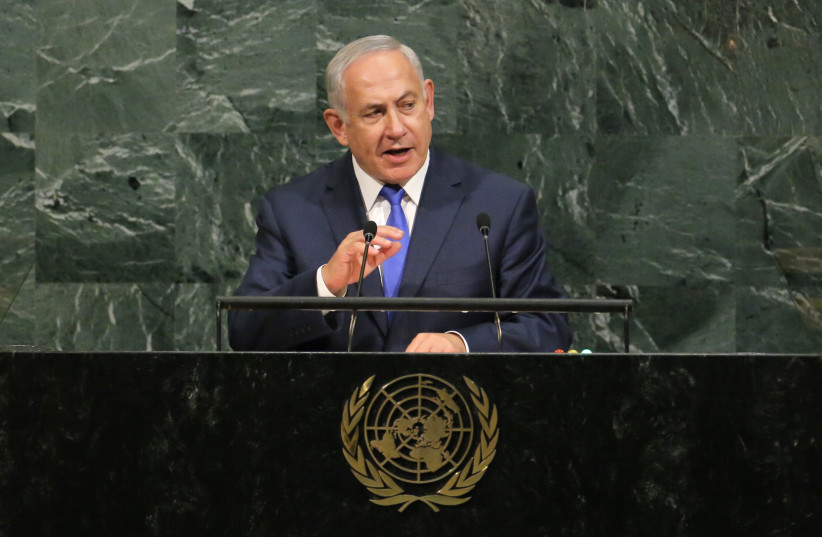Israel must not let the Oslo Accords wither away – editorial
Everyone from US President Joe Biden, to Jordan’s King Abdullah, to Turkey’s President Recep Tayyip Erdogan has raised the importance of finding a solution for the Israeli-Palestinian conflict as a prerequisite for stability in the region and for progress with Israel’s normalization efforts with Saudi Arabia.
Biden, in his speech to the General Assembly on Tuesday, said “Israel’s greater normalization and economic connection with its neighbors deliver positive and practical impacts even as we continue to work tirelessly for just and lasting peace, for Israelis and Palestinians, two states for two peoples.”
I remain committed to a vision of peace based on two states for two peoples.”
Benjamin Netanyahu, United Nations 2016
Abdullah, noting that “five million Palestinians live under occupation,” stressed that a two-state resolution to the conflict remained the only viable option.
“Without clarity on where the Palestinian future lies, it’s impossible to converge on a political solution to this conflict,” he said.
Erdogan, in his UNGA address, said that “without the realization of an independent and integrated Palestinian state, based on the 1967 borders, it is difficult for Israel to find the peace and security it seeks.”

Is it all just lip service, the one time in the year that the friends of the Palestinians trot out heartfelt calls for Palestinian statehood, while ignoring the issue the rest of the time? Or should Israel, intent on a deal with Saudi Arabia and increased integration in the Arab world, take these words to heart?
The latter track is the smarter one.
Thirty years after the Oslo Accords were born, there is much talk about its death. However, there is presently no alternative plan to end the conflict between the two peoples who covet the same land.
“I have not given up on peace. I remain committed to a vision of peace based on two states for two peoples. I believe as never before that changes taking place in the Arab world today offer a unique opportunity to advance that peace.”
Those words were spoken by Benjamin Netanyahu, then Israel’s prime minister, in an address to the United Nations General Assembly in September 2016.
Some of the changes that Netanyahu alluded to in 2016 have indeed come to pass in the interim years. The Abraham Accords have opened previously closed doors and made normalization with the Arab world a work in progress that was previously unthinkable.
However, a resolution to the Israeli-Palestinian conflict remains more distant and unattainable than ever. Rather than progress on the Israeli-Palestinian track, which was hoped for in the aftermath of the Abraham Accords, things have gotten steadily worse, with terrorism rampant and virtually no diplomatic contact between the sides.
Bad leadership?
Much of the blame is not due to Oslo, but can be directed toward the leadership on both sides. Palestinian leader Mahmoud Abbas is corrupt and ineffective; he engages in violent and hateful rhetoric, rewards terrorists for murdering Israelis, and regularly blames Israel for his failures. Here in Jerusalem, the current government includes extremist elements who favor offering the Palestinians nothing at all.
A two-state solution is very far off, and it is clearly impossible to implement today. It may never be possible, and continuing to tout the Oslo Accords could indeed be a matter of flogging a dead horse. The violence of the last two days in the West Bank and Gaza, as well as the onslaught of terror attacks this year, do not lend themselves to optimism.
But just as Israel is here, and not going anywhere, so are our neighbors – and that won’t change. Rather than bury the Oslo Accords, it is time to salvage what is left and explore new avenues and ideas.
That takes two partners, however. Israel, with its current government, appears to have no interest in being one and the Palestinians are both unwilling and incapable of rising to the challenge.
The Netanyahu government may wish to believe that a breakthrough with Saudi Arabia and normalization with the broader Arab world can take place without movement toward a resolution of the conflict with the Palestinians. But as the world leaders gathered at the UN in New York this week have expressed, the Palestinian issue remains very much on the global agenda. Israel should take heed.





Comments are closed.